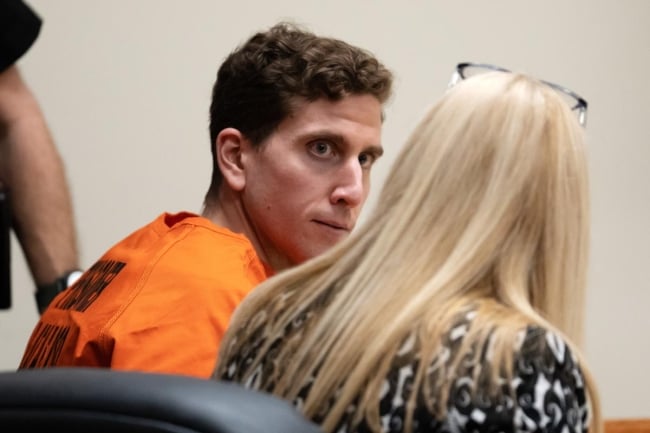You have /5 articles left.
Sign up for a free account or log in.

Bryan Kohberger, the alleged killer of four University of Idaho students, looks at his lawyer at his first hearing on Jan. 5. Kohberger was pursuing a Ph.D. in criminology at Washington State University at Pullman when the killings took place.
Ted S. Warren/Getty Images
Bryan Kohberger appeared at a courthouse in Latah County, Idaho, last Thursday to face murder charges for the brutal killings of four University of Idaho students in November.
Just two months ago, the 28-year-old was enrolled at Washington State University at Pullman, 10 miles from the Moscow, Idaho, campus where the killings occurred, finishing up his first semester of a criminology Ph.D. program in which students debate the motives of criminals, among other things, and study how prosecutors gather evidence.
By last week, he had become an inmate in an orange jumpsuit at Latah County Jail, and descriptions of his academic background were ubiquitous in the media coverage of his alleged crimes.
It’s tempting to draw a connection between Kohberger’s academic pursuits and the crime he’s accused of committing, but experts say that neither the evidence in the case nor the nature of criminology scholarship supports that link.
“Studying criminology is not going to make you a criminal, and it’s not going to make you a better criminal,” said James Alan Fox, a longtime professor of criminology at Northeastern University and the former dean of its College of Criminal Justice. “What we teach is ‘how come?’ Not ‘how.’”
Kohberger was a teaching assistant as well as a Ph.D. student at Pullman when he was arrested late last month. He was one of 34 students—24 doctoral candidates and 10 pursuing their master’s degrees—in the Department of Criminology and Criminal Justice. On Friday the university removed the department website listing its graduate students and their contact information, citing privacy concerns, but a cached version of the webpage was still available as of Monday.
Inside Higher Ed reached out to a dozen students using the information on that webpage, but none responded. Phil Weiler, WSU’s vice president of marketing and communications, wrote that one classmate, Shah Alam, was not available for media comment, but he did not address the other requests. Weiler also did not respond to a request for comment on the potential connection between Kohberger’s studies and his alleged killings.
After Kohberger’s arrest, administrators issued a statement saying the university was “aggrieved by the alleged horrendous acts of one of its graduate students.” Officials at DeSales University in Pennsylvania, where Kohberger received his bachelor’s and master’s degrees, issued a similar statement, writing, “We are devastated by this senseless tragedy” and “recognize the impact this news can have on our community’s well-being.”
Mary Ellen O’Toole, a former FBI profiler and the director of George Mason University’s forensic science program, said that while some psychopaths who commit mass murder harbor a fascination with criminals, she does not believe one necessarily leads to the other.
“People go into these subjects because they have an intellectual appetite for it,” she said. “It’s clear this individual did have an intellectual interest in criminology and the criminal mind … but I don’t think it was a cause-and-effect situation, where he chose to study this and his studies led him to become violent.”
“Studying criminology is no more likely to lead to crime than studying accounting is to lead to accounting fraud,” said Richard Rosenfeld, professor emeritus of criminology at the University of Missouri at St. Louis and a former president of the American Society of Criminology. ”The focus should be on that individual who has been accused of committing those murders and what brought him to that point. That has little to do with what he may have been learning in class.”
A ‘Brilliant Student’ of the Criminal Mind
Michelle Bolger, one of Kohberger’s criminology professors at DeSales, told the U.K. newspaper The Daily Mail that Kohberger had been a “brilliant student.”
“In my 10 years of teaching, I’ve only recommended two students to a Ph.D. program and he was one of them,” Bolger told the Mail. “He was one of my best students, ever.”
When reached for comment by Inside Higher Ed, Bolger forwarded the request to Carolyn Steigleman, DeSales’s associate vice president for marketing and communications, who wrote, “At this time faculty are not available for interviews about this matter.”
While at DeSales, Kohberger also studied under Katherine Ramsland, an expert on serial killers who helped Dennis Rader—also known as the BTK Killer, who strangled 10 people to death in Kansas in the mid-1970s—write his autobiography. Ramsland told Inside Higher Ed via email that she was “making no media statements at this time.”
Fox pushed back on those trying to connect Ramsland’s scholarship with Kohberger’s alleged killings.
“[The media] started playing on the fact that one of his professors had written a book about BTK, who was a serial killer, not a mass killer. These crimes are very different.” said Fox, who is also the author of Killer on Campus (Avon Books, 1996) and Extreme Killing (Sage, 2018). “I don’t think there’s any significance to that.”
O’Toole said revelations from the release of an affidavit last Wednesday indicated that even if Kohberger considered himself a student of crime as practice, he wasn’t a very good one.
“People are giving the suspect too much credit for his academic excellence,” she said. “Looking at the affidavit, there were a tremendous number of elementary mistakes made from a forensic and technological perspective that led to his arrest.”
Those mistakes include forgetting the knife sheath on one of the victims’ beds, being caught on camera circling the victims’ neighborhood in his car and turning his cellphone on while still near the residents’ house, she said—all pieces of evidence that helped lead to his arrest.
She also said that based on the details of his movements and the way he allegedly committed the murders, she doubts Kohberger’s intentions were experimental or scholarly in nature.
“The way he carried out these alleged murders does not point to some detached academic interest; this was need-driven behavior,” O’Toole said. “He came there to obliterate his victims out of hatred, which is a very scary state of mind, but which also put him at greater risk of giving himself away.”
Stranger Than Fiction
In 1990, Fox, then serving as the dean of Northeastern’s College of Criminal Justice, was invited to join the task force investigating a mass killing in Gainesville, Fla., where the bodies of five University of Florida students had been found mutilated during orientation week. He eventually helped solve the case, leading to a USA Today profile that dubbed him the “Dean of Death.” Later, Fox said, a production company optioned the story and commissioned a screenplay based loosely on the investigation, in which a professor with his name helps solve a string of murders committed by one of his students.
In the screenplay, which was never produced, the fictional Professor Fox was able to link his student to the crimes based on handwriting analysis, and he was haunted by the potential connection between the murders and his teaching.
But the real Gainesville killer was not a student, and Fox said those kinds of connections between the classroom and the motives and methods of a killer “really only exist in movies and television shows.” He said he never liked the drama How to Get Away With Murder precisely because it mischaracterized the work of criminologists and criminal law scholars, leading many to believe that you could, in fact, learn how to commit the perfect crime from a college course.
“Most criminology, particularly at the Ph.D. level, really doesn’t focus on the analysis of crime scenes,” Fox said. “It’s more theory, research and statistics, criminal psychology, etc.”
According to the website for the DeSales master’s program in criminal justice, which Kohberger completed in 2021, the curriculum consists of six core classes: advanced criminology, research methods, ethics, justice systems and processes, statistics and data analysis, and a project seminar. Potential electives for graduate students do include courses on forensics and crime scene analysis, but Steigleman said she did not have access to Kohberger’s class records and did not know whether he’d taken them.
In an article published Monday in The Idaho Statesman, Benjamin Roberts, a master’s student in criminology and criminal justice at WSU Pullman who took classes with Kohberger, said his classmate’s arrest had put his own studies into sharp relief.
“The stories you’re reading in the paper, the cases you’re reviewing, the studies you’re doing, it can become easy to forget that they’re connected to real people,” Roberts told the Statesman. “People lose people and find their kid’s bed empty. There’s a real heaviness looking at that and realizing and remembering, this is not just some sterile academic subject. This is something that affects people.”
Roberts did not respond to an interview request from Inside Higher Ed.
Fox said he’s had students before whose fascination with violent criminals bordered on the concerning. Some even collected what Fox called “murderabilia,” trading cards and other souvenirs bearing the likenesses of serial killers such as Jeffrey Dahmer and Ted Bundy.
But their fascination, he said, never resulted in violent crime. And whatever numbness might result from the repeated exposure to violent crime that comes with studying criminology, Fox said there’s no reason to link Kohberger’s alleged actions to his scholarship or professors.
“Some people, a very small minority, study criminology because they may identify with the perpetrator. But that doesn’t mean they’re going to act on that,” Fox said. “I really do not think anything about his academic training is responsible.”





